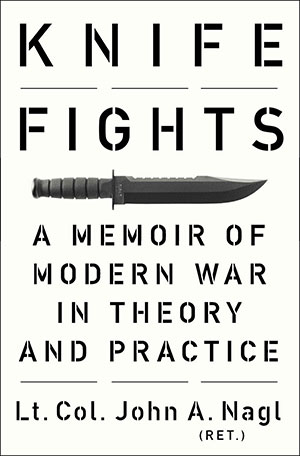Журнальный клуб Интелрос » Joint Force Quarterly » №80, 2016

John Nagl, the author of Learning to Eat Soup with a Knife, offers an intimate portrait of the education, experience, and practice that contributed to his emergence as one of the premier advocates of counterinsurgency (COIN) doctrine during the past decade. In Knife Fights he provides an unvarnished description of what it is like to advocate doctrinal change to a nation at war.
Nagl begins his story by giving readers vivid and engaging accounts of his early formative experiences: undergraduate studies at West Point, his first combat action during Operation Desert Storm, and his graduate and doctoral studies at Oxford. These accounts depict a journey of experience combined with scholarship that laid the foundation for Learning to Eat Soup with a Knife. Although Nagl’s experience during Desert Storm was with classic conventional warfare, he ultimately became interested in the ambiguous pursuits of counterinsurgency operations. It was at Oxford where Nagl came to believe that U.S. military leaders had walked away from COIN doctrine after Vietnam. This resistance to counterinsurgency operations constituted a hole in U.S. military doctrine waiting to be exploited by our enemies.
Nagl describes what it was like to watch that exploitation happen during his second deployment to Iraq in 2004–2005. He found himself in the unenviable position of attempting to unify practice with the theories he had studied at Oxford and use them against the thinking and adaptive enemies in Anbar Province. This section of the book contains descriptions of the difficulties military leaders faced because of the lack of planning for post-invasion operations. The demobilization of the Iraqi army combined with senior leader refusal to recognize a developing insurgency created opportunities that insurgents exploited. These descriptions will be poignant for readers who may have experienced similar challenges and ambiguities while deployed in Iraq or Afghanistan.
The chapter entitled “COIN Revisited” is one of the most engaging portions of the book. Nagl provides detailed analysis of the last 14 years of COIN theory and practice. Readers interested in understanding the positions of COIN advocates will find this section illuminating as it presents some thoughtful reflections by Nagl. He also provides detailed discussions of the importance of combat advisors in counterinsurgency and the need to provide language and cultural training to succeed. Nagl asserts that because most opponents cannot compete with U.S. conventional capabilities, irregular operations represent the most likely way future opponents will fight our forces. U.S. leaders who do not prepare for such a possibility do so at their own peril.
Knife Fights is a window into the education, experiences, and leader development of a warrior-scholar through two different conflicts over two decades. Few senior U.S. leaders predicted the challenges that would result from the events that began on September 11, 2001. Nagl asserts that the need for ongoing doctrine, training, and leader development to deal with the challenges created by insurgents should have been anticipated. This was not the case, however, because leaders incorrectly assumed that after Vietnam, U.S. forces would never again engage in counterinsurgency operations. The consequences of this mistaken assumption would become all too apparent first in Afghanistan and then in Iraq. According to Nagl, U.S. leaders can ill afford repeating this mistake by discarding the lessons gained over the last 14 years at the cost of so much blood and treasure: “The final tragedy of Iraq and Afghanistan would occur if we again forget the many lessons we have learned about counterinsurgency over the past decade of war, and have to learn them yet again in some future war at the cost of many more American lives” (p. 234). JFQ